人教版九年级英语全册Unit1How can we become good learners单元知识点总结
文档属性
| 名称 | 人教版九年级英语全册Unit1How can we become good learners单元知识点总结 |
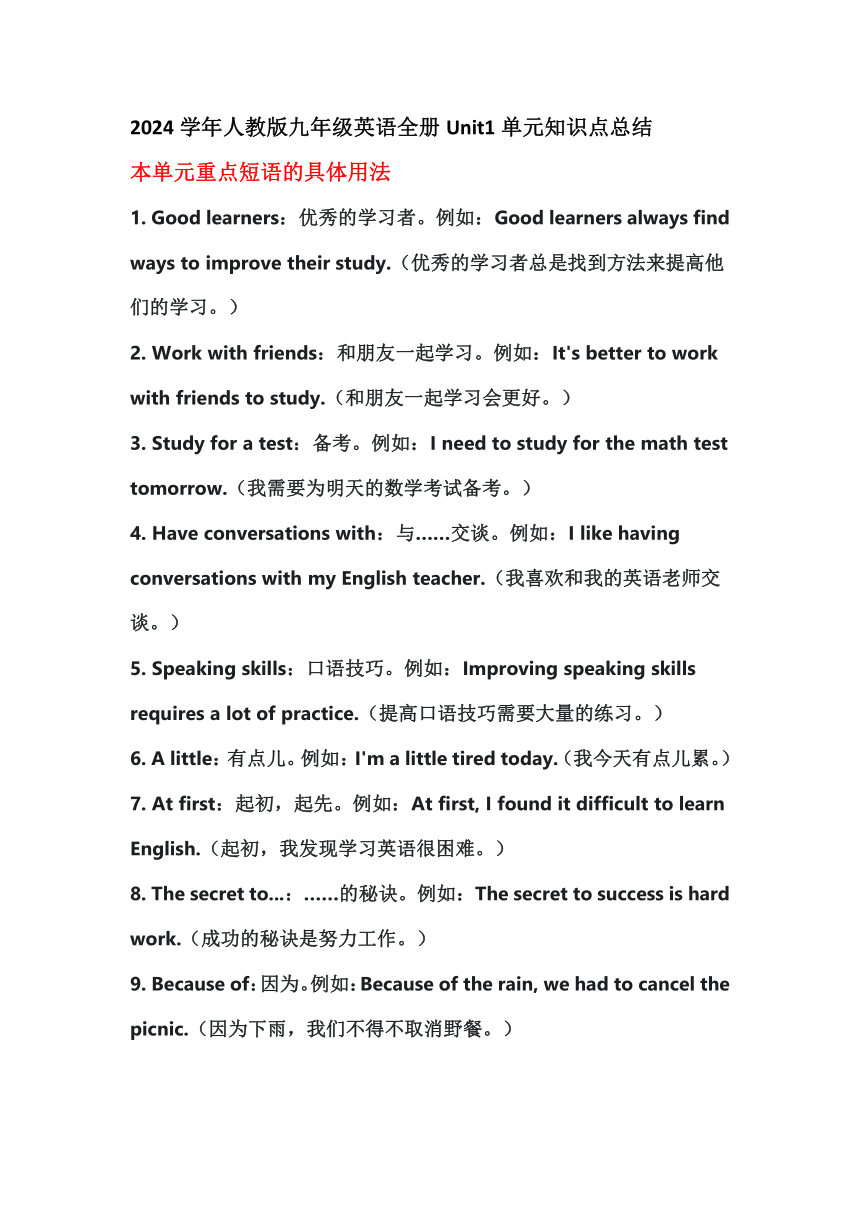
|
|
| 格式 | docx | ||
| 文件大小 | 22.8KB | ||
| 资源类型 | 教案 | ||
| 版本资源 | 人教新目标(Go for it)版 | ||
| 科目 | 英语 | ||
| 更新时间 | 2024-02-25 22:30:52 | ||
图片预览

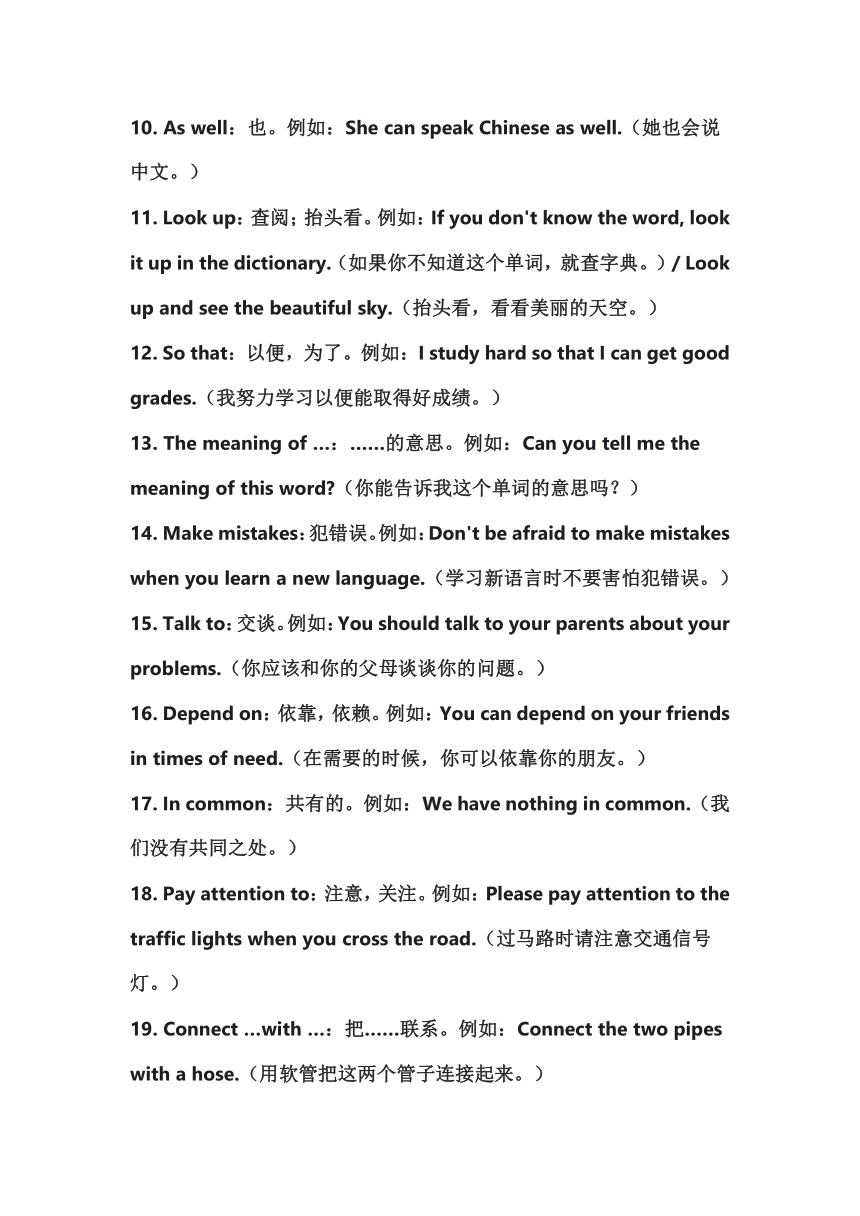
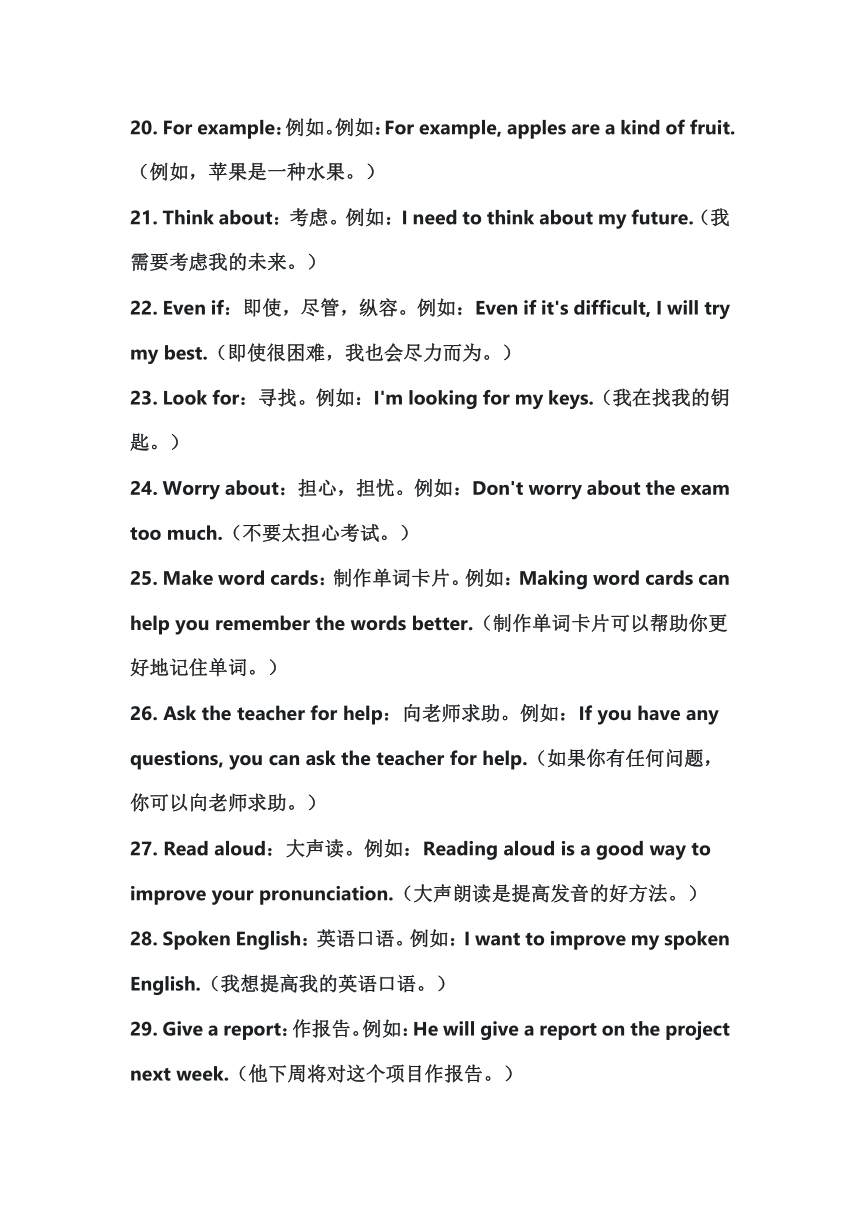
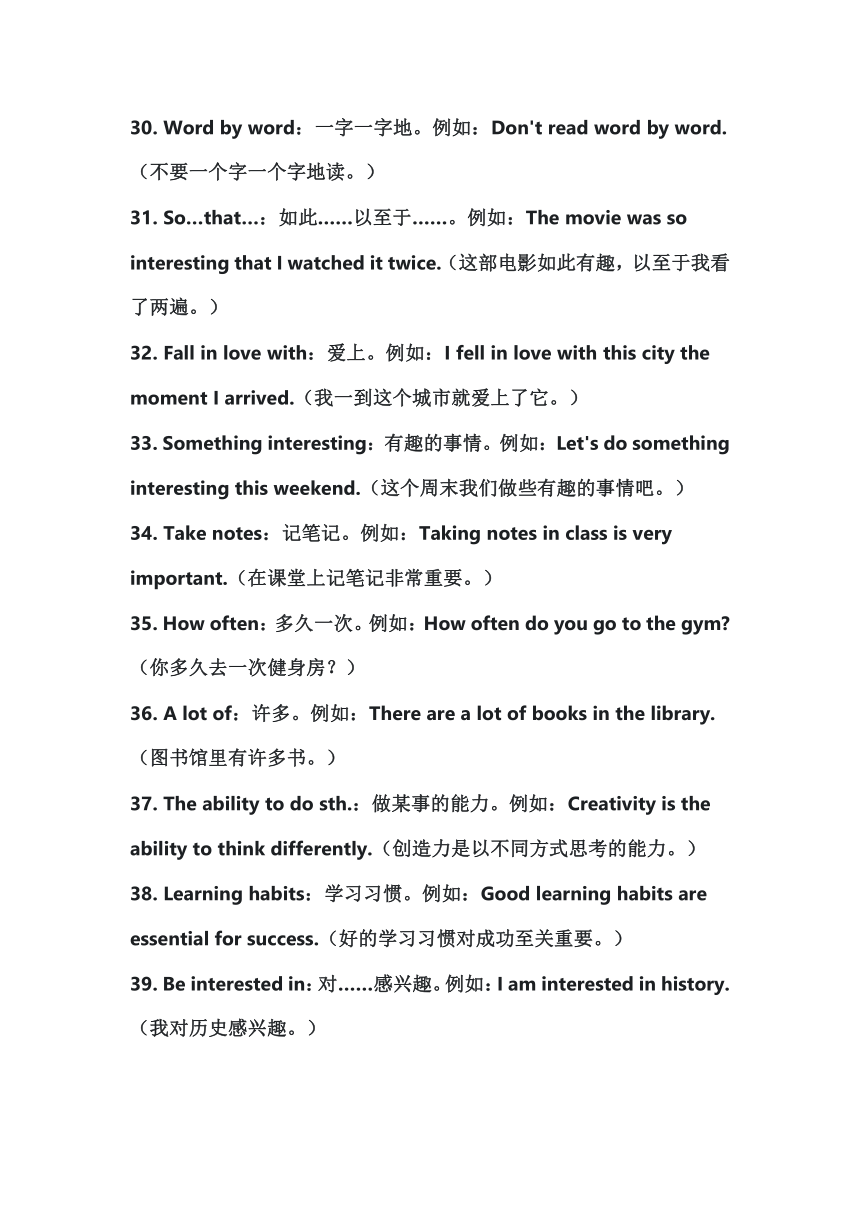
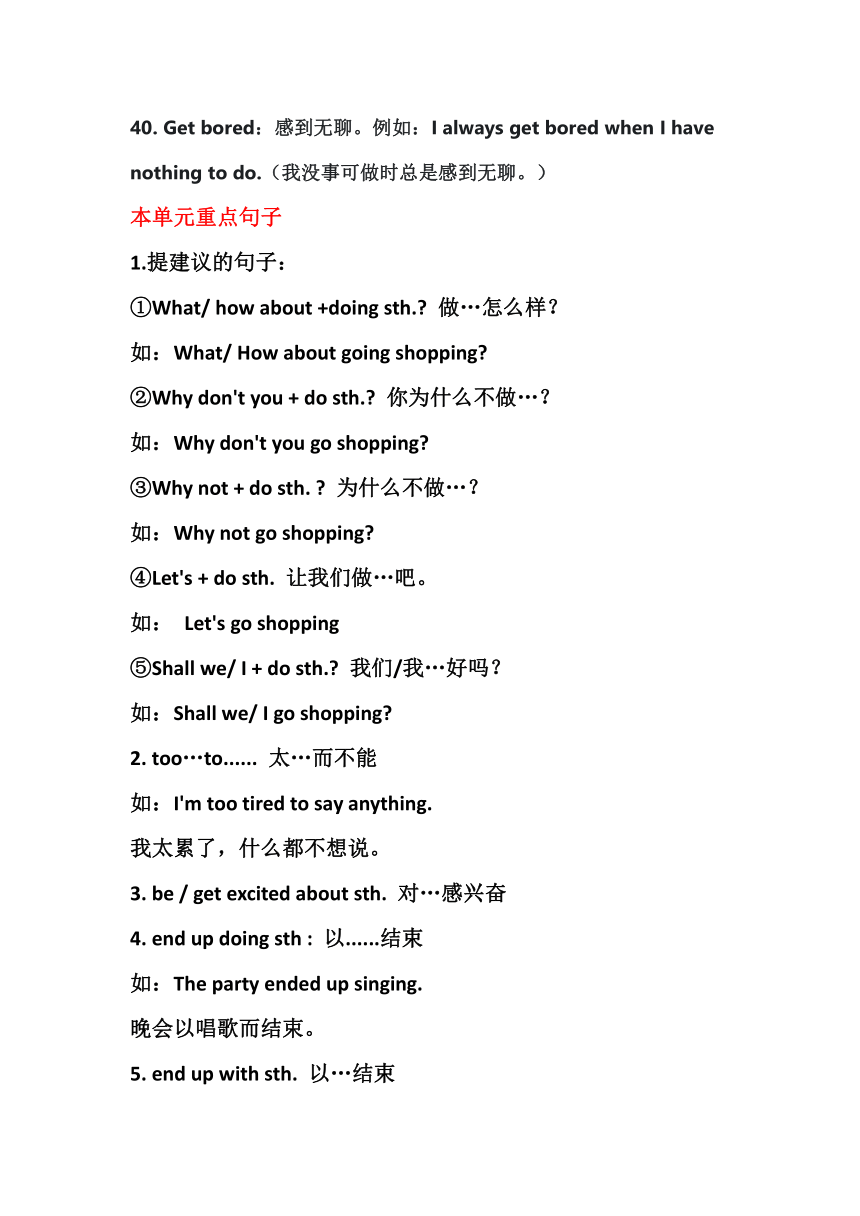
文档简介
2024学年人教版九年级英语全册Unit1单元知识点总结
本单元重点短语的具体用法
1. Good learners:优秀的学习者。例如:Good learners always find ways to improve their study.(优秀的学习者总是找到方法来提高他们的学习。)
2. Work with friends:和朋友一起学习。例如:It's better to work with friends to study.(和朋友一起学习会更好。)
3. Study for a test:备考。例如:I need to study for the math test tomorrow.(我需要为明天的数学考试备考。)
4. Have conversations with:与……交谈。例如:I like having conversations with my English teacher.(我喜欢和我的英语老师交谈。)
5. Speaking skills:口语技巧。例如:Improving speaking skills requires a lot of practice.(提高口语技巧需要大量的练习。)
6. A little:有点儿。例如:I'm a little tired today.(我今天有点儿累。)
7. At first:起初,起先。例如:At first, I found it difficult to learn English.(起初,我发现学习英语很困难。)
8. The secret to...:……的秘诀。例如:The secret to success is hard work.(成功的秘诀是努力工作。)
9. Because of:因为。例如:Because of the rain, we had to cancel the picnic.(因为下雨,我们不得不取消野餐。)
10. As well:也。例如:She can speak Chinese as well.(她也会说中文。)
11. Look up:查阅;抬头看。例如:If you don't know the word, look it up in the dictionary.(如果你不知道这个单词,就查字典。)/ Look up and see the beautiful sky.(抬头看,看看美丽的天空。)
12. So that:以便,为了。例如:I study hard so that I can get good grades.(我努力学习以便能取得好成绩。)
13. The meaning of …:……的意思。例如:Can you tell me the meaning of this word (你能告诉我这个单词的意思吗?)
14. Make mistakes:犯错误。例如:Don't be afraid to make mistakes when you learn a new language.(学习新语言时不要害怕犯错误。)
15. Talk to:交谈。例如:You should talk to your parents about your problems.(你应该和你的父母谈谈你的问题。)
16. Depend on:依靠,依赖。例如:You can depend on your friends in times of need.(在需要的时候,你可以依靠你的朋友。)
17. In common:共有的。例如:We have nothing in common.(我们没有共同之处。)
18. Pay attention to:注意,关注。例如:Please pay attention to the traffic lights when you cross the road.(过马路时请注意交通信号灯。)
19. Connect …with …:把……联系。例如:Connect the two pipes with a hose.(用软管把这两个管子连接起来。)
20. For example:例如。例如:For example, apples are a kind of fruit.(例如,苹果是一种水果。)
21. Think about:考虑。例如:I need to think about my future.(我需要考虑我的未来。)
22. Even if:即使,尽管,纵容。例如:Even if it's difficult, I will try my best.(即使很困难,我也会尽力而为。)
23. Look for:寻找。例如:I'm looking for my keys.(我在找我的钥匙。)
24. Worry about:担心,担忧。例如:Don't worry about the exam too much.(不要太担心考试。)
25. Make word cards:制作单词卡片。例如:Making word cards can help you remember the words better.(制作单词卡片可以帮助你更好地记住单词。)
26. Ask the teacher for help:向老师求助。例如:If you have any questions, you can ask the teacher for help.(如果你有任何问题,你可以向老师求助。)
27. Read aloud:大声读。例如:Reading aloud is a good way to improve your pronunciation.(大声朗读是提高发音的好方法。)
28. Spoken English:英语口语。例如:I want to improve my spoken English.(我想提高我的英语口语。)
29. Give a report:作报告。例如:He will give a report on the project next week.(他下周将对这个项目作报告。)
30. Word by word:一字一字地。例如:Don't read word by word.(不要一个字一个字地读。)
31. So…that…:如此……以至于……。例如:The movie was so interesting that I watched it twice.(这部电影如此有趣,以至于我看了两遍。)
32. Fall in love with:爱上。例如:I fell in love with this city the moment I arrived.(我一到这个城市就爱上了它。)
33. Something interesting:有趣的事情。例如:Let's do something interesting this weekend.(这个周末我们做些有趣的事情吧。)
34. Take notes:记笔记。例如:Taking notes in class is very important.(在课堂上记笔记非常重要。)
35. How often:多久一次。例如:How often do you go to the gym (你多久去一次健身房?)
36. A lot of:许多。例如:There are a lot of books in the library.(图书馆里有许多书。)
37. The ability to do sth.:做某事的能力。例如:Creativity is the ability to think differently.(创造力是以不同方式思考的能力。)
38. Learning habits:学习习惯。例如:Good learning habits are essential for success.(好的学习习惯对成功至关重要。)
39. Be interested in:对……感兴趣。例如:I am interested in history.(我对历史感兴趣。)
40. Get bored:感到无聊。例如:I always get bored when I have nothing to do.(我没事可做时总是感到无聊。)
本单元重点句子
1.提建议的句子:
①What/ how about +doing sth. 做…怎么样?
如:What/ How about going shopping
②Why don't you + do sth. 你为什么不做…?
如:Why don't you go shopping
③Why not + do sth. 为什么不做…?
如:Why not go shopping
④Let's + do sth. 让我们做…吧。
如: Let's go shopping
⑤Shall we/ I + do sth. 我们/我…好吗?
如:Shall we/ I go shopping
2. too…to...... 太…而不能
如:I'm too tired to say anything.
我太累了,什么都不想说。
3. be / get excited about sth. 对…感兴奋
4. end up doing sth : 以......结束
如:The party ended up singing.
晚会以唱歌而结束。
5. end up with sth. 以…结束
如: The party ended up with her singing.
晚会以她的歌唱而告终。
本单元重点语法讲解
1. I’m a little nervous.
“a little”和“little”的区别如下:
- 释义不同:
- a little:意为“adv.少量地,稍许地;adj.少量的,稍许的”。
- little:意为“adj.小的;琐碎的;娇小的;幼小的;adv.不多,略微;少许,一点;短时间地”。
- 侧重点不同:
- a little表示某事物的量较少,此处的“少”是相对于“多”而言的。
- little侧重于表示数量上的“少”或“无”。
- 用法不同:
- a little用在肯定句中表示有一点儿,全句还是肯定句。
- little用在肯定句中表示无和没有,本身带有否定用意,所以全句是否定句。
- 后接的词不同:
- a little和little后都接不可数名词或形容词。
“a little”和“little”都用于修饰不可数名词。“a little”表示的是肯定意义,虽然不多,但是还有一点儿;而“little”表示的是否定意义,数量非常的少,甚至几乎没有。
2. Don’t read word by word.
肯定祈使句和否定祈使句的区别主要在于它们所表达的指令或请求的态度和语气。
肯定祈使句通常以动词原形开头,没有主语,直接表达一个命令、建议或请求。例如:
- Come here.(过来。)
- Open the door.(开门。)
- Be quiet.(安静。)
否定祈使句则在动词原形前加上否定词"don't"或"do not",表示不要做某件事情。例如:
- Don't smoke.(不要吸烟。)
- Do not run in the hallway.(不要在走廊里奔跑。)
- Don't be late.(不要迟到。)
肯定祈使句的语气通常比较直接、明确,传达出一种积极的要求或期望。它们用于指示对方执行某个动作或采取某种行为。否定祈使句的语气则更加强调禁止或不允许的意思,用于阻止对方做某件事情。
在使用祈使句时,需要根据具体的情境和意图来选择使用肯定或否定形式。同时,语气的强度和礼貌程度也可以通过词汇的选择、语调的变化等方式来进行调整。
以下是一些例句,帮助你更好地理解肯定祈使句和否定祈使句的区别:
肯定祈使句:
- Pass the salt, please.(请递一下盐。)
- Let's go to the park.(我们去公园吧。)
- Have a nice day!(祝你有美好的一天!)
否定祈使句:
- Don't touch that!(别碰那个!)
- Stop talking.(别说话了。)
- Don't forget to bring your umbrella.(别忘了带雨伞。)
3. But whether or not you can do this well depends on your learning habit.
(1)“whether”引导的主语从句意为“是否”,只起连接作用,不充当任何成分。“whether”引导的主语从句,置于句首时必须用“whether”引导,置于句尾时,间或可用“if”。其具体用法和例句如下:
- 当“whether”引导的主语从句放在句尾而用形式主语时,形式主语只能用“it”,而不能使用“this”,“that”等代词。
- Whether we'll go camping tomorrow depends on the weather. 我们明天是否去野营取决于天气。
- “if”引导主语从句时,只能位于句中,且其前须用“it”作形式主语。
- It is not clear if you can do it. 还不清楚你能否做这件事情。
(2)if在引导宾语从句时,作“是否”讲,常放在动词ask、see、say、know和find out等后面。一般情况下,两者常可换用,在口语中多用if。例如:Nobody knows whether (if)it will rain tomorrow. 没有人知道明天是否下雨。
if或whether引导宾语从句时,要注意三个方面,即连词、语序和时态。具体内容如下:
- if或whether不能和that或其它连词、副词同时使用,也不能省去。
- if或whether引导的宾语从句,虽具有疑问意义,但从句语序应用陈述句语序。
- if或whether引导的宾语从句应和主句的时态保持一致。即:主句为一般现在时,从句用任一种时态;主句为一般过去时,从句则用过去时中的任一种时态。
if 和 whether 均可表示“是否”,一般情况下二者可以互换。但在下列条件下,只能用 whether 而不能用 if:
- 引导主语从句和宾语从句时,只能用 whether 而不能用 if。例如:
- Whether he can come to the party remains a question.(主语从句)他是否能来参加聚会还是个问题。
- She asked me whether I could help her.(宾语从句)她问我是否能帮她。
- 在引导表语从句和同位语从句时,只能用 whether 而不能用 if。例如:
- The question is whether we can get there on time.(表语从句)问题是我们能否按时到达那里。
- The doctor didn't know whether he should tell the truth to the patient.(同位语从句)医生不知道他是否应该向病人透露真相。
- 在引导让步状语从句时,只能用 whether 而不能用 if。例如:
- Whether you like it or not, you have to do it.(让步状语从句)不管你是否喜欢,你都必须做这件事。
- I'll do it whether it takes me a day or a week.(让步状语从句)我会做这件事,不管它需要我一天还是一周的时间。
- 在引导条件状语从句时,只能用 if 而不能用 whether。例如:
- If it doesn't rain, we'll go to the park.(条件状语从句)如果不下雨,我们就去公园。
- I'll tell him the news if he comes back.(条件状语从句)如果他回来,我会告诉他这个消息。
4. The more you read, the faster you’ll be.
该句型为比较级的基本句型,在中考英语中,通常用来表示一方的程度随着另一方的程度平行增长,意为“越……,(就)越……”。例如:
- The harder you study, the better grades you will get. 你学习越努力,得到的成绩就越高。
- The more carefully you are, the fewer mistakes you will make. 你越仔细,犯的错就越少。
(1)“形容词/副词的比较级+and+形容词/副词的比较级”以及(2)“as+ 形容词/副词的原级+ as...(也可以用 not so... as...,表示前者不如后者)”的具体用法和例句:
(1)“形容词/副词的比较级+and+形容词/副词的比较级”:这个结构表示某个事物在程度上逐渐增加或变得更加怎样。例如:
- The weather is getting hotter and hotter.(天气变得越来越热。)
- The girl becomes more and more beautiful.(这个女孩变得越来越漂亮。)
- He runs faster and faster.(他跑得越来越快。)
在中考中,可能会要求学生用这个结构来描述事物的变化或进行比较。例如,要求学生描述一个人的技能逐渐提高,或者环境的变化等。
(2)“as+ 形容词/副词的原级+ as...”用于比较两个事物在某方面的程度相同,“not so... as...”则表示前者不如后者。例如:
- She is as tall as her sister.(她和她姐姐一样高。)
- This book is not so interesting as that one.(这本书不如那本有趣。)
- He doesn't run as fast as Tom.(他跑得没有汤姆快。)
在中考中,可能会要求学生用这些结构来比较人或事物的特征、能力等。例如,比较两个人的性格、成绩,或者比较不同事物的质量、大小等。5. I also realize I could get the meaning by listening for just the key words.
(1)在英语中考中,“by”的这个用法比较常见。以下是一些具体的用法和例句:
- 表示“由、靠、用、通过”等意思:We went to the museum by bus.(我们乘公交车去了博物馆。)
- He succeeded by working hard.(他通过努力工作获得了成功。)
- The letter was written by hand.(这封信是手写的。)
- I learned English by watching movies.(我通过看电影学习英语。)
(2)“by”后面接表示交通工具的名词时,不用冠词,意思是“乘坐某种交通工具”。例如:
- I go to school by bike.(我骑自行车去上学。)
- They will go to Beijing by plane.(他们将乘飞机去北京。)
- She travels to work by subway.(她乘地铁去上班。)
作文训练
本单元话题为“学会学习”,与之相关的话题作文主要为谈论英语学习方法,这是各地中考英语真题中最常考的话题作文之一。写作时可根据具体要求或提示,对相关的学习方法提出建议。
典型例题
为了交流学习经验,提高学习效率,某初中英语学习报正在举办以“how to be a good learner”为题的征文比赛,请踊跃投稿。
优秀范文
How to be a good learner
To be a good learner, we should have good habits and ways of learning. We need to get ready for our lessons before class and always listen carefully in class. After class, we must go over the lessons and finish our homework on time. It’s good to study in groups and help each other. We should do more reading in our free time. If we have any problems, we’d better ask others for help. As a student, working hard is important, but don’t forget to do sports and keep healthy.I think all above is helpful to us to be a good learner.
本单元重点短语的具体用法
1. Good learners:优秀的学习者。例如:Good learners always find ways to improve their study.(优秀的学习者总是找到方法来提高他们的学习。)
2. Work with friends:和朋友一起学习。例如:It's better to work with friends to study.(和朋友一起学习会更好。)
3. Study for a test:备考。例如:I need to study for the math test tomorrow.(我需要为明天的数学考试备考。)
4. Have conversations with:与……交谈。例如:I like having conversations with my English teacher.(我喜欢和我的英语老师交谈。)
5. Speaking skills:口语技巧。例如:Improving speaking skills requires a lot of practice.(提高口语技巧需要大量的练习。)
6. A little:有点儿。例如:I'm a little tired today.(我今天有点儿累。)
7. At first:起初,起先。例如:At first, I found it difficult to learn English.(起初,我发现学习英语很困难。)
8. The secret to...:……的秘诀。例如:The secret to success is hard work.(成功的秘诀是努力工作。)
9. Because of:因为。例如:Because of the rain, we had to cancel the picnic.(因为下雨,我们不得不取消野餐。)
10. As well:也。例如:She can speak Chinese as well.(她也会说中文。)
11. Look up:查阅;抬头看。例如:If you don't know the word, look it up in the dictionary.(如果你不知道这个单词,就查字典。)/ Look up and see the beautiful sky.(抬头看,看看美丽的天空。)
12. So that:以便,为了。例如:I study hard so that I can get good grades.(我努力学习以便能取得好成绩。)
13. The meaning of …:……的意思。例如:Can you tell me the meaning of this word (你能告诉我这个单词的意思吗?)
14. Make mistakes:犯错误。例如:Don't be afraid to make mistakes when you learn a new language.(学习新语言时不要害怕犯错误。)
15. Talk to:交谈。例如:You should talk to your parents about your problems.(你应该和你的父母谈谈你的问题。)
16. Depend on:依靠,依赖。例如:You can depend on your friends in times of need.(在需要的时候,你可以依靠你的朋友。)
17. In common:共有的。例如:We have nothing in common.(我们没有共同之处。)
18. Pay attention to:注意,关注。例如:Please pay attention to the traffic lights when you cross the road.(过马路时请注意交通信号灯。)
19. Connect …with …:把……联系。例如:Connect the two pipes with a hose.(用软管把这两个管子连接起来。)
20. For example:例如。例如:For example, apples are a kind of fruit.(例如,苹果是一种水果。)
21. Think about:考虑。例如:I need to think about my future.(我需要考虑我的未来。)
22. Even if:即使,尽管,纵容。例如:Even if it's difficult, I will try my best.(即使很困难,我也会尽力而为。)
23. Look for:寻找。例如:I'm looking for my keys.(我在找我的钥匙。)
24. Worry about:担心,担忧。例如:Don't worry about the exam too much.(不要太担心考试。)
25. Make word cards:制作单词卡片。例如:Making word cards can help you remember the words better.(制作单词卡片可以帮助你更好地记住单词。)
26. Ask the teacher for help:向老师求助。例如:If you have any questions, you can ask the teacher for help.(如果你有任何问题,你可以向老师求助。)
27. Read aloud:大声读。例如:Reading aloud is a good way to improve your pronunciation.(大声朗读是提高发音的好方法。)
28. Spoken English:英语口语。例如:I want to improve my spoken English.(我想提高我的英语口语。)
29. Give a report:作报告。例如:He will give a report on the project next week.(他下周将对这个项目作报告。)
30. Word by word:一字一字地。例如:Don't read word by word.(不要一个字一个字地读。)
31. So…that…:如此……以至于……。例如:The movie was so interesting that I watched it twice.(这部电影如此有趣,以至于我看了两遍。)
32. Fall in love with:爱上。例如:I fell in love with this city the moment I arrived.(我一到这个城市就爱上了它。)
33. Something interesting:有趣的事情。例如:Let's do something interesting this weekend.(这个周末我们做些有趣的事情吧。)
34. Take notes:记笔记。例如:Taking notes in class is very important.(在课堂上记笔记非常重要。)
35. How often:多久一次。例如:How often do you go to the gym (你多久去一次健身房?)
36. A lot of:许多。例如:There are a lot of books in the library.(图书馆里有许多书。)
37. The ability to do sth.:做某事的能力。例如:Creativity is the ability to think differently.(创造力是以不同方式思考的能力。)
38. Learning habits:学习习惯。例如:Good learning habits are essential for success.(好的学习习惯对成功至关重要。)
39. Be interested in:对……感兴趣。例如:I am interested in history.(我对历史感兴趣。)
40. Get bored:感到无聊。例如:I always get bored when I have nothing to do.(我没事可做时总是感到无聊。)
本单元重点句子
1.提建议的句子:
①What/ how about +doing sth. 做…怎么样?
如:What/ How about going shopping
②Why don't you + do sth. 你为什么不做…?
如:Why don't you go shopping
③Why not + do sth. 为什么不做…?
如:Why not go shopping
④Let's + do sth. 让我们做…吧。
如: Let's go shopping
⑤Shall we/ I + do sth. 我们/我…好吗?
如:Shall we/ I go shopping
2. too…to...... 太…而不能
如:I'm too tired to say anything.
我太累了,什么都不想说。
3. be / get excited about sth. 对…感兴奋
4. end up doing sth : 以......结束
如:The party ended up singing.
晚会以唱歌而结束。
5. end up with sth. 以…结束
如: The party ended up with her singing.
晚会以她的歌唱而告终。
本单元重点语法讲解
1. I’m a little nervous.
“a little”和“little”的区别如下:
- 释义不同:
- a little:意为“adv.少量地,稍许地;adj.少量的,稍许的”。
- little:意为“adj.小的;琐碎的;娇小的;幼小的;adv.不多,略微;少许,一点;短时间地”。
- 侧重点不同:
- a little表示某事物的量较少,此处的“少”是相对于“多”而言的。
- little侧重于表示数量上的“少”或“无”。
- 用法不同:
- a little用在肯定句中表示有一点儿,全句还是肯定句。
- little用在肯定句中表示无和没有,本身带有否定用意,所以全句是否定句。
- 后接的词不同:
- a little和little后都接不可数名词或形容词。
“a little”和“little”都用于修饰不可数名词。“a little”表示的是肯定意义,虽然不多,但是还有一点儿;而“little”表示的是否定意义,数量非常的少,甚至几乎没有。
2. Don’t read word by word.
肯定祈使句和否定祈使句的区别主要在于它们所表达的指令或请求的态度和语气。
肯定祈使句通常以动词原形开头,没有主语,直接表达一个命令、建议或请求。例如:
- Come here.(过来。)
- Open the door.(开门。)
- Be quiet.(安静。)
否定祈使句则在动词原形前加上否定词"don't"或"do not",表示不要做某件事情。例如:
- Don't smoke.(不要吸烟。)
- Do not run in the hallway.(不要在走廊里奔跑。)
- Don't be late.(不要迟到。)
肯定祈使句的语气通常比较直接、明确,传达出一种积极的要求或期望。它们用于指示对方执行某个动作或采取某种行为。否定祈使句的语气则更加强调禁止或不允许的意思,用于阻止对方做某件事情。
在使用祈使句时,需要根据具体的情境和意图来选择使用肯定或否定形式。同时,语气的强度和礼貌程度也可以通过词汇的选择、语调的变化等方式来进行调整。
以下是一些例句,帮助你更好地理解肯定祈使句和否定祈使句的区别:
肯定祈使句:
- Pass the salt, please.(请递一下盐。)
- Let's go to the park.(我们去公园吧。)
- Have a nice day!(祝你有美好的一天!)
否定祈使句:
- Don't touch that!(别碰那个!)
- Stop talking.(别说话了。)
- Don't forget to bring your umbrella.(别忘了带雨伞。)
3. But whether or not you can do this well depends on your learning habit.
(1)“whether”引导的主语从句意为“是否”,只起连接作用,不充当任何成分。“whether”引导的主语从句,置于句首时必须用“whether”引导,置于句尾时,间或可用“if”。其具体用法和例句如下:
- 当“whether”引导的主语从句放在句尾而用形式主语时,形式主语只能用“it”,而不能使用“this”,“that”等代词。
- Whether we'll go camping tomorrow depends on the weather. 我们明天是否去野营取决于天气。
- “if”引导主语从句时,只能位于句中,且其前须用“it”作形式主语。
- It is not clear if you can do it. 还不清楚你能否做这件事情。
(2)if在引导宾语从句时,作“是否”讲,常放在动词ask、see、say、know和find out等后面。一般情况下,两者常可换用,在口语中多用if。例如:Nobody knows whether (if)it will rain tomorrow. 没有人知道明天是否下雨。
if或whether引导宾语从句时,要注意三个方面,即连词、语序和时态。具体内容如下:
- if或whether不能和that或其它连词、副词同时使用,也不能省去。
- if或whether引导的宾语从句,虽具有疑问意义,但从句语序应用陈述句语序。
- if或whether引导的宾语从句应和主句的时态保持一致。即:主句为一般现在时,从句用任一种时态;主句为一般过去时,从句则用过去时中的任一种时态。
if 和 whether 均可表示“是否”,一般情况下二者可以互换。但在下列条件下,只能用 whether 而不能用 if:
- 引导主语从句和宾语从句时,只能用 whether 而不能用 if。例如:
- Whether he can come to the party remains a question.(主语从句)他是否能来参加聚会还是个问题。
- She asked me whether I could help her.(宾语从句)她问我是否能帮她。
- 在引导表语从句和同位语从句时,只能用 whether 而不能用 if。例如:
- The question is whether we can get there on time.(表语从句)问题是我们能否按时到达那里。
- The doctor didn't know whether he should tell the truth to the patient.(同位语从句)医生不知道他是否应该向病人透露真相。
- 在引导让步状语从句时,只能用 whether 而不能用 if。例如:
- Whether you like it or not, you have to do it.(让步状语从句)不管你是否喜欢,你都必须做这件事。
- I'll do it whether it takes me a day or a week.(让步状语从句)我会做这件事,不管它需要我一天还是一周的时间。
- 在引导条件状语从句时,只能用 if 而不能用 whether。例如:
- If it doesn't rain, we'll go to the park.(条件状语从句)如果不下雨,我们就去公园。
- I'll tell him the news if he comes back.(条件状语从句)如果他回来,我会告诉他这个消息。
4. The more you read, the faster you’ll be.
该句型为比较级的基本句型,在中考英语中,通常用来表示一方的程度随着另一方的程度平行增长,意为“越……,(就)越……”。例如:
- The harder you study, the better grades you will get. 你学习越努力,得到的成绩就越高。
- The more carefully you are, the fewer mistakes you will make. 你越仔细,犯的错就越少。
(1)“形容词/副词的比较级+and+形容词/副词的比较级”以及(2)“as+ 形容词/副词的原级+ as...(也可以用 not so... as...,表示前者不如后者)”的具体用法和例句:
(1)“形容词/副词的比较级+and+形容词/副词的比较级”:这个结构表示某个事物在程度上逐渐增加或变得更加怎样。例如:
- The weather is getting hotter and hotter.(天气变得越来越热。)
- The girl becomes more and more beautiful.(这个女孩变得越来越漂亮。)
- He runs faster and faster.(他跑得越来越快。)
在中考中,可能会要求学生用这个结构来描述事物的变化或进行比较。例如,要求学生描述一个人的技能逐渐提高,或者环境的变化等。
(2)“as+ 形容词/副词的原级+ as...”用于比较两个事物在某方面的程度相同,“not so... as...”则表示前者不如后者。例如:
- She is as tall as her sister.(她和她姐姐一样高。)
- This book is not so interesting as that one.(这本书不如那本有趣。)
- He doesn't run as fast as Tom.(他跑得没有汤姆快。)
在中考中,可能会要求学生用这些结构来比较人或事物的特征、能力等。例如,比较两个人的性格、成绩,或者比较不同事物的质量、大小等。5. I also realize I could get the meaning by listening for just the key words.
(1)在英语中考中,“by”的这个用法比较常见。以下是一些具体的用法和例句:
- 表示“由、靠、用、通过”等意思:We went to the museum by bus.(我们乘公交车去了博物馆。)
- He succeeded by working hard.(他通过努力工作获得了成功。)
- The letter was written by hand.(这封信是手写的。)
- I learned English by watching movies.(我通过看电影学习英语。)
(2)“by”后面接表示交通工具的名词时,不用冠词,意思是“乘坐某种交通工具”。例如:
- I go to school by bike.(我骑自行车去上学。)
- They will go to Beijing by plane.(他们将乘飞机去北京。)
- She travels to work by subway.(她乘地铁去上班。)
作文训练
本单元话题为“学会学习”,与之相关的话题作文主要为谈论英语学习方法,这是各地中考英语真题中最常考的话题作文之一。写作时可根据具体要求或提示,对相关的学习方法提出建议。
典型例题
为了交流学习经验,提高学习效率,某初中英语学习报正在举办以“how to be a good learner”为题的征文比赛,请踊跃投稿。
优秀范文
How to be a good learner
To be a good learner, we should have good habits and ways of learning. We need to get ready for our lessons before class and always listen carefully in class. After class, we must go over the lessons and finish our homework on time. It’s good to study in groups and help each other. We should do more reading in our free time. If we have any problems, we’d better ask others for help. As a student, working hard is important, but don’t forget to do sports and keep healthy.I think all above is helpful to us to be a good learner.
同课章节目录
- Unit 1 How can we become good learners.
- Section A
- Section B
- Unit 2 I think that mooncakes are delicious!
- Section A
- Section B
- Unit 3 Could you please tell me where the restroom
- Section A
- Section B
- Unit 4 I used to be afraid of the dark.
- Section A
- Section B
- Unit 5 What are the shirts made of?
- Section A
- Section B
- Review of Units 1-5
- Unit 6 When was it invented?
- Section A
- Section B
- Unit 7 Teenagers should be allowed to choose their
- Section A
- Section B
- Unit 8 It must belong to Carla.
- Section A
- Section B
- Unit 9 I like music that I can dance to.
- Section A
- Section B
- Unit 10 You're supposed to shake hands.
- Section A
- Section B
- Review of Units 6-10
- Unit 11 Sad movies make me cry.
- Section A
- Section B
- Unit 12 Life is full of the unexpected
- Section A
- Section B
- Unit 13 We're trying to save the earth!
- Section A
- Section B
- Unit 14 I remember meeting all of you in Grade 7.
- Section A
- Section B
- Review of Units 11-14
